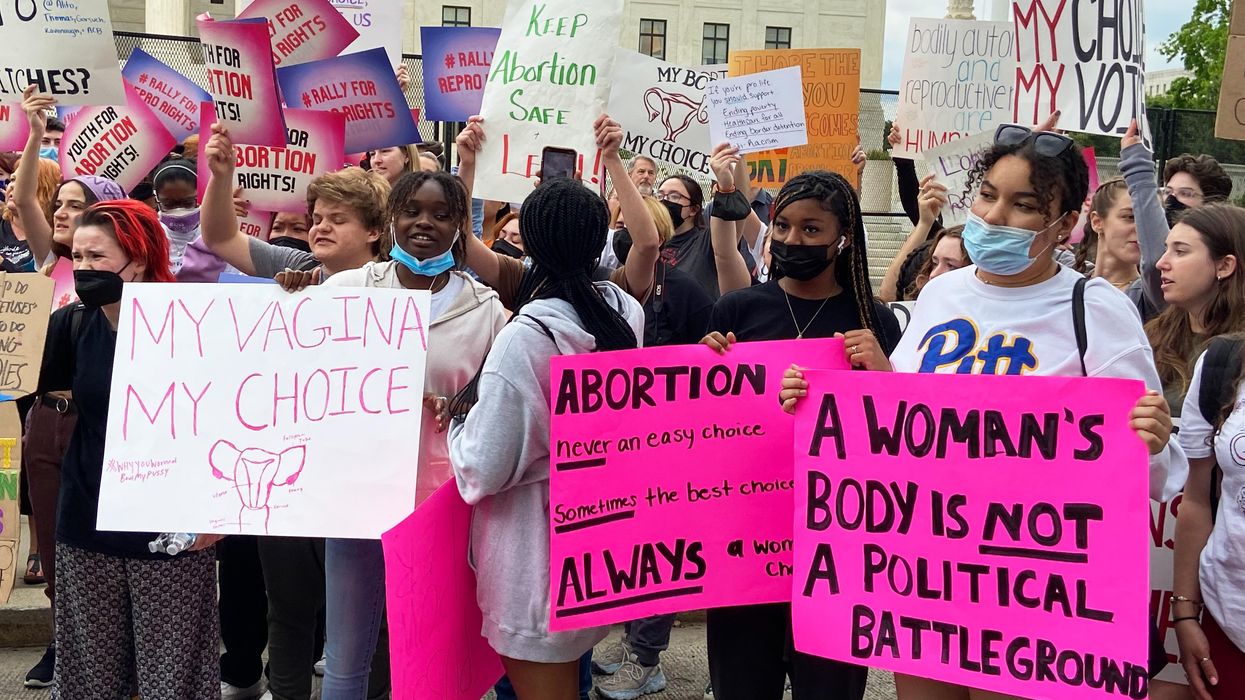Roe v Wade Abortion Rights Are Gone & These Are The States Where Bans Are Expected
Some states aren't making exceptions.

Women protesting about abortion access in Washington, D.C.
The landmark U.S. Supreme Court ruling Roe v. Wade was officially overturned on Friday, opening the door for conservative lawmakers to ban or restrict abortion for millions of people across the country.
Critics are blasting the move as a major step back for women and gender rights, while backers are preparing for states to impose strict new rules around who can and can't get a procedure done.
The decision comes after a Supreme Court leak signalled that this would happen back in May, and little has changed since that news first broke.
Without Roe v. Wade, states will be allowed to make their own rules around abortions, and many have already been sitting on "trigger" laws for exactly this moment.
Essentially, about half of the U.S. states are expected to ban or severely restrict abortion in the coming days, weeks and months, according to the Guttmacher Institute, an organization that tracks such laws.
"The Supreme Court has taken away our right to abortion and overturned Roe v. Wade, opening the floodgates for states across the country to ban abortion," tweeted Planned Parenthood Action.
\u201cBREAKING: The Supreme Court has taken away our right to abortion and overturned Roe v. Wade, opening the floodgates for states across the country to ban abortion.\n\nThe court has failed us all \u2014 but this is far from over. \u2935\u201d— Planned Parenthood Action (@Planned Parenthood Action) 1656080742
"The court has failed us all — but this is far from over."
At the moment, lawmakers have signalled that abortion will soon become prohibited or restricted in 20 states, while 10 states have not signalled clearly which way they'll go, according to an analysis by The New York Times.
States like Alabama, Arkansas, Kentucky, Louisiana, Missouri, South Dakota, Tennessee, Texas, Arizona and Ohio are expected to ban abortions with no exceptions for rape or incest, according to the Times and the Guttmacher Institute.
In addition to those states, Idaho, Mississippi, North Dakota, Utah, West Virginia, Wyoming, Florida, Georgia, and South Carolina are also expected to prohibit or restrict access to abortions.
Other states such as Indiana, Iowa, Kansas, Michigan, Montana, Nebraska, North Carolina, Pennsylvania, Virginia and Wisconsin are uncertain about their stance on abortion policy. That means they could go one way or another depending on who is in charge.
Alaska, Colorado, Illinois, Maine, Massachusetts, Minnesota, Nevada, New Hampshire, New Mexico, Rhode Island, California, Connecticut, D.C., Delaware, Hawaii, Maryland, New Jersey, New York, Oregon, Vermont and Washington are likely to keep abortions legal, according to the Guttmacher Institute.
U.S. President Joe Biden blasted the Supreme Court for its decision on Friday, but couldn't do anything to overturn it.
"This is an extreme and dangerous path the court is now taking us on," Biden said at a news conference.
"The Supreme Court expressly took away a Constitutional right from the American people that it had already recognized," he added on Twitter.
"They simply took it away. That's never been done to a right that is so important to so many Americans."
- Jagmeet Singh Says Roe v. Wade Leak Is 'Deeply Concerning ... ›
- The End Of Roe v. Wade Could Lead To Abortion Bans In Up To ... ›
- The US Supreme Court Overturned Roe v Wade & Abortion Is No ... ›
- Congressman Matt Gaetz Got Ripped For Blaming Roe V. Wade ... ›
- A Roe v. Wade Leak Threatens US Abortion Rights & Here's Why ... ›
- US Supreme Court Justices Say 'Challenge' Post-Roe v. Wade Could Be Financing A Trip To Canada - Narcity ›
- Olivia Rodrigo Sings 'F*ck You' To The US Supreme Court During Her Glastonbury Set (VIDEO) - Narcity ›
- Here's How Canada's Leading Politicians Are Responding To The US Overturning Roe v. Wade - Narcity ›
- Canadian TikTokers Offer Homes To Americans Who Need To Travel After Roe v. Wade Outcome - Narcity ›
- Disney Workers Will Get A 'Travel Benefit' For Abortions Since Florida Plans To Ban Them - Narcity ›
- Billie Joe Armstrong Said 'F*ck America' & He's 'Renouncing' Citizenship Over Roe v Wade - Narcity ›
- Phoebe Bridgers Led A 'F*ck The Supreme Court' Chant & Artists Didn't Hold Back At Glastonbury - Narcity ›
- WWE's Kayla Braxton Said She's A 'Product Of Rape' & Her Roe v Wade Take Is So Powerful - Narcity ›
- A Republican Slipped Up On Roe v Wade & Called It A Win For 'White Life' At A Trump Rally - Narcity ›
- Here Are What Abortion Rights In Canada Look Like & How Experts Are Saying They Should Change - Narcity ›
- Florida Politician Matt Gaetz Doubled Down On Body Shaming Women After A Roe V. Wade Speech - Narcity ›
- A US Senator Just Introduced An Abortion Ban & He's Not Married Or Has Kids - Narcity ›